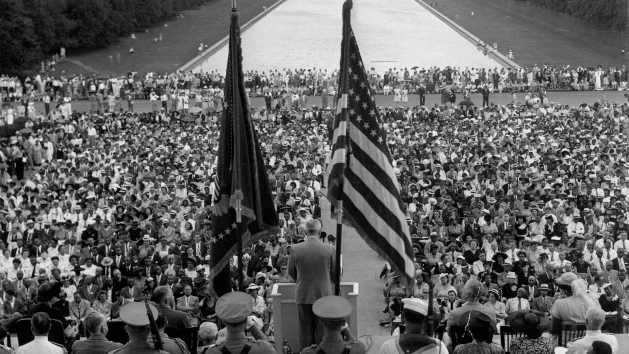Salzburg Global Fellow Justin Simundson believes that justice and equality must shape America's role in the world
This article was written by Salzburg Global Fellow Justin Simundson, who attended the Salzburg Global American Studies program on “Crossing the Pacific: The Asian American Experience in U.S. Society and Discourse” in September 2024.
With the United States navigating a dangerous era of renewed great power competition abroad and rising hate and discrimination at home, it is essential to recognize that this combination of challenges is not new. For those understandably fearful of the world’s darkening horizons, history offers an important reminder: The nation has successfully confronted these twin threats before.
During the Cold War, the United States extended civil rights domestically while maintaining the moral authority that helped achieve a peaceful victory over communism. This success was not only the result of military strength but also the power of American ideals: freedom, democracy, and human rights.
Though the present moment feels bleak, the same guiding principles can illuminate a path forward. Staying true to democratic values and respect for human rights remains the surest way to weather the storms of illiberalism and authoritarianism gathering today.
The connection between civil rights and global leadership was clearly visible during the Cold War, most notably in the U.S. government’s amicus brief for Brown v. Board of Education. The brief highlighted the impossibility of the U.S. standing for freedom abroad while tolerating discrimination and inequality at home. As Secretary of State Dean Acheson warned in his letter accompanying the brief, racial discrimination severely undermined American influence abroad:
“The United States is under constant attack in the foreign press, over the foreign radio, and in such international bodies as the United Nations because of various practices of discrimination against minority groups in this country. ... [T]he continuance of racial discrimination in the United States remains a source of constant embarrassment to this Government in the day-to-day conduct of its foreign relations; and it jeopardizes the effective maintenance of our moral leadership of the free and democratic nations of the world.”
Replace “the foreign radio” with “social media” and Acheson’s insights resonate as strongly today as they did in 1952. Once again, America’s leadership on the global stage is under strain, in part due to the persistence of discrimination and injustice within our borders.
As in the Cold War era, illiberal voices argue that discrimination reflects true American values and label those who fight for justice as enemies or even “communists.” Yet it is not the advocates of justice, but the defenders of injustice, who pose the real threat to national security.
Those who perpetuate discrimination divide Americans against one another, demoralize those striving to improve the nation, and weaken the bonds between the U.S. and its allies. Their actions humiliate our country in the world’s eyes, eroding the moral leadership essential to continuing American influence. The U.S. simply cannot and will not maintain its preeminent standing in the world if it follows the path of prejudice that forswears human rights at home and abroad, turning citizens into subjects and friends into enemies.
While the challenges of today may feel overwhelming, the lessons of the 20th century remind us that progress often emerges from moments of crisis. The fights against fascism and communism were marked by dark moments but also propelled significant advances in freedom and human rights, both at home and abroad. The success of those struggles led many to take progress for granted, forgetting the sacrifices that were required to achieve it.
The outcome of the 21st century’s struggle against authoritarianism and extremism remains uncertain, but history teaches us that defeat comes only if we give up the fight. As before, the struggle for justice - whether in foreign policy or domestic society - is essential to national defense. Activists advocating for human rights or peace and justice today are not enemies within; they are as vital to democracy’s survival as diplomats or military personnel.
Justice at home and abroad are inextricably linked. We must hold ourselves accountable, recognize where our actions have diverged from our ideals, and commit to returning to the path of moral righteousness. As in the past, the fight for freedom demands sacrifice and challenges our faith in progress. Yet it is only through struggle that freedom is redefined, expanded, and perfected.
Author’s note: The views expressed in this article are those of the author and do not necessarily reflect the official policy or position of the United States Air Force Academy, the Air Force, the Department of Defense, or the U.S. Government.
Justin Simundson is an assistant professor of History and the U.S. Air Force Academy. He is the editor of Crooked Bamboo: A Memoir from Inside the Diem Regime by Nguyen Thai, which highlights Mr. Thai's experiences as a high-level South Vietnamese propaganda official and as a personal aide to President Ngo Dinh Diem. Dr. Simundson attended the US Naval Academy for three years and completed his undergraduate work at Augustana University. He earned his MA at the University of South Dakota and PhD in History from Texas Tech University in 2017. His academic work focuses on the politics and propaganda of counterinsurgency in the Vietnam War.
Explore our digital publication, which includes more coverage from the Salzburg Global American Studies program on “Crossing the Pacific: The Asian American Experience in U.S. Society and Discourse.”


